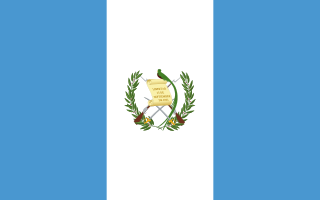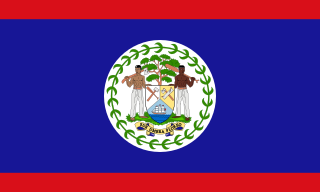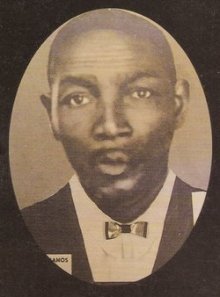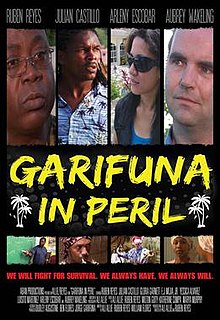
This article is about the demographics of the population of Saint Vincent and the Grenadines, including population density, ethnicity, religious affiliations and other aspects of the population.

The Kalinago, also known as the Island Caribs or simply Caribs, are an indigenous people of the Lesser Antilles in the Caribbean. They may have been related to the Mainland Caribs (Kalina) of South America, but they spoke an unrelated language known as Island Carib. They also spoke a pidgin language associated with the Mainland Caribs.

This article is about the demographic features of the population of Belize, including population density, ethnicity, education level, health of the populace, economic status, religious affiliations and other aspects of the population.

Dangriga, formerly known as Stann Creek Town, is a town in southern Belize, located on the Caribbean coast at the mouth of the North Stann Creek River. It is the capital of Belize's Stann Creek District. Dangriga is served by the Dangriga Airport. Commonly known as the "culture capital of Belize" due to its influence on punta music and other forms of Garifuna culture, Dangriga is the largest settlement in southern Belize.

The Garifuna people are a mixed African and indigenous people who originally lived on the Caribbean island of Saint Vincent and speak Garifuna, an Arawakan language, and Vincentian Creole.
Garifuna music is an ethnic music and dance with African, Arawak, and Kalinago elements, originating with the Afro-Indigenous Garifuna people from Central America and Saint Vincent and the Grenadines. In 2001, Garifuna music, dance, and language were collectively proclaimed as a Masterpiece of the Oral and Intangible Heritage of Humanity by UNESCO.

Zambo is a racial term historically used in the Spanish to refer to people of mixed Indigenous and African ancestry. Occasionally in the 21st century, the term is used in the Americas to refer to persons who are of mixed Black and Indigenous American ancestry. Historically, the racial cross between enslaved Africans and Amerindians was referred to as a zambayga, then zambo, then sambo.

Guatemalans are people connected to the country of Guatemala. This connection may be residential, legal, historical or cultural. For most Guatemalans, several of these connections exist.
Punta is an Afro-indigenous dance and cultural music originated by the Garifuna people of Saint Vincent (Antilles) with African and Arawak elements.

Utila(Isla de Utila) is the smallest of Honduras' major Bay Islands, after Roatán and Guanaja, in a region that marks the south end of the Mesoamerican Barrier Reef System, the second-largest in the world.
Garifuna (Karif) is a minority language widely spoken in villages of Garifuna people in the western part of the northern coast of Central America.

Arawakan, also known as Maipurean, is a language family that developed among ancient indigenous peoples in South America. Branches migrated to Central America and the Greater Antilles in the Caribbean and the Atlantic, including what is now the Bahamas. Almost all present-day South American countries are known to have been home to speakers of Arawakan languages, the exceptions being Ecuador, Uruguay, and Chile. Maipurean may be related to other language families in a hypothetical Macro-Arawakan stock.

The culture of Belize is a mix of influences and people from Kriol, Maya, East Indian, Garinagu, Mestizo, Mennonites who are of German descent, with many other cultures from Chinese to Lebanese. It is a unique blend that emerged through the country's long and occasionally violent history.

Belizeans are people associated with the country of Belize through citizenship or descent. Belize is a multiethnic country with residents of African, Amerindian, European and Asian descent or any combination of those groups.

Thomas Vincent Ramos, commonly known as T. V. Ramos, was a Belizean civil rights activist who promoted the interests of the Garifuna people, and is now considered a national hero.

Afro-Nicaraguans are non-indigenous Nicaraguans of Sub-Saharan African descent. Five main distinct ethnic groups exist: The Creoles who descend from Anglo-Caribbean countries and many of whom still speak Nicaragua English Creole, the Miskito Sambus descendants of Spanish slaves and indigenous Central Americans who still speak Miskito and/or Miskito Coast Creole, the Garifunas descendents of Zambos expelled from St. Vincent who speak Garifuna, the Rama Cay zambos a subset of the Miskito who speak Rama Cay Creole, and the descendants of those enslaved by the Spanish.

Afro-Hondurans or Black Hondurans are Hondurans of Sub-Saharan African descent. The CIA world factbook regards their population to be around 2% of the country's population. Estimates vary with concervative estimates ranging as low as 1% and higher estimates ranging to 30%. They descended from: enslaved Africans by the Spanish, as well as those who were enslaved from the West Indies and identify as Creole peoples, and the Garifuna who descend from exiled zambo Maroons from Saint Vincent. The Creole people were originally from Jamaica and other Caribbean islands, while the Garifuna people were originally from Saint Vincent and the Grenadines. Garifunas arrived in the late seventeen hundreds and the Creole peoples arrived during the eighteen hundreds.

Garifuna Americans or Black Carib Americans are Americans of Garifuna descent with origins from Honduras, Guatemala, Belize, Nicaragua, and Saint Vincent and the Grenadines. They trace their ancestry to the Garifuna, who were descendents of Arawak, Kalinago, and Afro-Caribbean people living in Saint Vincent.

Garifuna in Peril is a low-budget independent fiction docufiction feature film directed, written, and produced by Alí Allié and Rubén Reyes. The film depicts historical and contemporary issues within the Garinagu Afro-Honduran indigenous community and features a cast of actors from Honduras and Belize.














